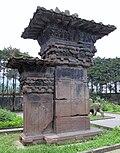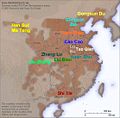Sichuan
Sichuan (or Szechuan) is a province in the southwest of the People's Republic of China. It is one of the largest provinces in China, with an area of over 485,000 square kilometers and a population of over 81 million people. The capital of Sichuan is Chengdu, which is one of the most important economic, financial, commercial, cultural, transportation, and communication centers in Western China.
Geography[edit]
Sichuan is located in the upper reach of the Yangtze River and the hinterland of Southwest China. It is bordered by Qinghai to the northwest, Gansu to the north, Shaanxi to the northeast, Chongqing to the east, Guizhou to the southeast, Yunnan to the south, and Tibet to the west.
History[edit]
Sichuan has a rich history dating back to the Neolithic Age. It was the place where several tribal states, including the Shu and Ba, emerged. These states were eventually conquered by the Qin Dynasty in 316 BC, which led to the consolidation of Sichuan into China.
Economy[edit]
Sichuan is one of China's major agricultural production bases. The fertile Sichuan Basin, irrigated by the Dujiangyan Irrigation System, is often called "the food basket of China". Sichuan also has rich mineral resources, with more than 132 kinds of minerals. The province is also a major industrial center, with industries such as iron and steel, coal, electric power, natural gas, petroleum, chemical, building materials, textile, electronics, food, and nuclear industry.
Culture[edit]
Sichuan is known for its rich and diverse culture. It is the birthplace of Sichuan opera, one of the oldest and most interesting forms of Chinese opera. Sichuan cuisine, known for its bold flavors and use of chili peppers, is one of the eight major cuisines of China.
See also[edit]
Ad. Transform your life with W8MD's Budget GLP-1 injections from $49.99


W8MD offers a medical weight loss program to lose weight in Philadelphia. Our physician-supervised medical weight loss provides:
- Weight loss injections in NYC (generic and brand names):
- Zepbound / Mounjaro, Wegovy / Ozempic, Saxenda
- Most insurances accepted or discounted self-pay rates. We will obtain insurance prior authorizations if needed.
- Generic GLP1 weight loss injections from $49.99 for the starting dose of Semaglutide and $65.00 for Tirzepatide.
- Also offer prescription weight loss medications including Phentermine, Qsymia, Diethylpropion, Contrave etc.
NYC weight loss doctor appointmentsNYC weight loss doctor appointments
Start your NYC weight loss journey today at our NYC medical weight loss and Philadelphia medical weight loss clinics.
- Call 718-946-5500 to lose weight in NYC or for medical weight loss in Philadelphia 215-676-2334.
- Tags:NYC medical weight loss, Philadelphia lose weight Zepbound NYC, Budget GLP1 weight loss injections, Wegovy Philadelphia, Wegovy NYC, Philadelphia medical weight loss, Brookly weight loss and Wegovy NYC
|
WikiMD's Wellness Encyclopedia |
| Let Food Be Thy Medicine Medicine Thy Food - Hippocrates |
Medical Disclaimer: WikiMD is not a substitute for professional medical advice. The information on WikiMD is provided as an information resource only, may be incorrect, outdated or misleading, and is not to be used or relied on for any diagnostic or treatment purposes. Please consult your health care provider before making any healthcare decisions or for guidance about a specific medical condition. WikiMD expressly disclaims responsibility, and shall have no liability, for any damages, loss, injury, or liability whatsoever suffered as a result of your reliance on the information contained in this site. By visiting this site you agree to the foregoing terms and conditions, which may from time to time be changed or supplemented by WikiMD. If you do not agree to the foregoing terms and conditions, you should not enter or use this site. See full disclaimer.
Credits:Most images are courtesy of Wikimedia commons, and templates, categories Wikipedia, licensed under CC BY SA or similar.
Translate this page: - East Asian
中文,
日本,
한국어,
South Asian
हिन्दी,
தமிழ்,
తెలుగు,
Urdu,
ಕನ್ನಡ,
Southeast Asian
Indonesian,
Vietnamese,
Thai,
မြန်မာဘာသာ,
বাংলা
European
español,
Deutsch,
français,
Greek,
português do Brasil,
polski,
română,
русский,
Nederlands,
norsk,
svenska,
suomi,
Italian
Middle Eastern & African
عربى,
Turkish,
Persian,
Hebrew,
Afrikaans,
isiZulu,
Kiswahili,
Other
Bulgarian,
Hungarian,
Czech,
Swedish,
മലയാളം,
मराठी,
ਪੰਜਾਬੀ,
ગુજરાતી,
Portuguese,
Ukrainian













